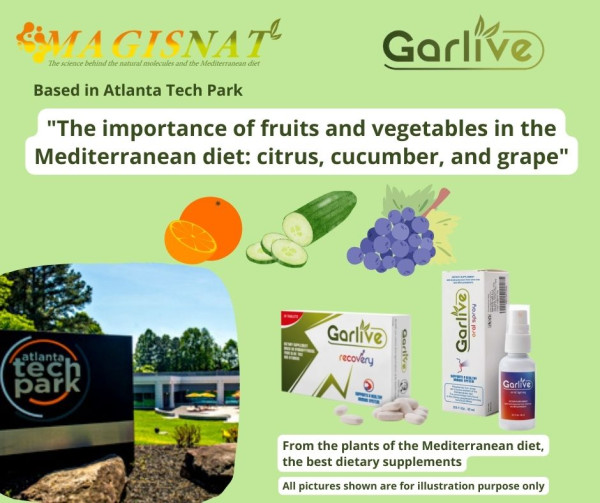The importance of fruits and vegetables in the Mediterranean diet: citrus, cucumber, and grape

United States, 29th Nov 2022, King NewsWire – The meetings between MAGISNAT, an innovative Italian-American spin-off (www.magisnat.com), and the committee of the Fondazione Policlinico Agostino Gemelli IRCCS (Rome, Italy) are currently ongoing.
This last week of November, a truly relevant topic was addressed, namely, “the importance of fruits and vegetables in the Mediterranean diet: citrus, cucumber, and grape” (https://www.jpmh.org/index.php/jpmh/article/view/2743/1007).
First of all, it is important to say that fruits and vegetables are excellent sources of bioactive and nutraceutical compounds. Regular consumption of fruits and vegetables helps preventing the onset and progression of many noncommunicable diseases (NCDs).
As has been reiterated in the previous meetings, the Mediterranean diet includes daily consumption of fruits and vegetables for maximum health benefits.

Precisely for this reason, the Italian and American professors and researchers wanted to focus their attention, above all, on three foods: citrus, cucumber, and grape.
Many research and scientific studies have proven that these foods have antioxidant, anti-inflammatory, antimicrobial, cardioprotective, anti-aging, and anti-cancer properties.
In addition, these studies indicate that eating citrus fruits, cucumbers, and grapes reduces hypertension, hyperlipidemia, skin problems, and infections; moreover, it also improves the health of the cardiovascular and nervous systems.
In particular, citrus fruits, a distinctive component of the Mediterranean diet, are rich in vitamins, minerals and fiber, and contain no sodium, fats or cholesterol. They are also rich in carotenoids and polyphenols, which prevent cardiovascular disease and cancer.
In addition, citrus fruits are an important source of vitamin C, which plays a key role in the absorption of inorganic iron, thus helping to alleviate anemia—of course, when combined with appropriate medication.
From citrus fruits, it is possible to extract flavonoids, which can reduce the levels of blood sugar, triglyceride, and cholesterol.
Then the committee, together with MAGISNAT, focused on cucumbers (Cucumis sativus L.), which belong to the Cucurbitaceae family and are widely grown around the world.
They can be eaten raw (as in salads), fermented (pickled) or cooked; and also have countless beneficial properties, including: antioxidant, antibacterial and antifungals, antitumor activity, cytotoxicity, hepatoprotective activity, hypoglycemic and hypolipidemic activity.
Finally, the meeting ended with a discussion about grapes. Grapes are known all over the world, from California in the United States to Portugal, Lebanon, and Syria.
Grapes are mainly used to make wine, but some types of grapes can be included in the daily diet, as a fruit.
Grapes, and consequently wine, contain high concentrations of phenolic acids, flavanols, flavon-3-ols, myricetin, peonidine, flavonoids, resveratrol, quercetin, tannins, anthocyanins, cyanidin, ellagic acid, and proanthocyanins.
Contrary to what one may think, wine, although an alcoholic beverage, is an integral part of the Mediterranean diet; of course, it must be consumed with moderation. The polyphenolic component of wine and grapes, in general, can have great health-protective effects. In particular, it has cardioprotective effects due to the presence of potassium, a mineral that maintains fluid balance in the body and that can help lower high blood pressure and reduce the likelihood of developing heart diseases and strokes. It may have positive effects on the skin, thanks to vitamin E, which helps keep skin supple and hydrated and prevents acne. It also strengthens the immune system due to the presence of resveratrol, which promotes wound healing and prevents bacterial infections, as well as slowing down the normal aging process.
Moreover, grapes promote bowel movements, thus maintaining a healthy digestive system. Grape seed extract has been shown to play an important role in fighting irritable bowel syndrome, while grape skin is rich in melatonin, which is important for ensuring circadian rhythms.
Thus, fruits and vegetables can never be lacking in people’s diets. If, however, it turns out to be difficult to take them, due to today’s society’s hectic life, one can always resort to the use of dietary supplements. For this reason, MAGISNAT has decided to promote a line of supplements based on Hydroxytyrosol, GARLIVE Recovery and GARLIVE Oral Spray, both available on Amazon (https://www.amazon.com/garlive).
More specifically, GARLIVE ORAL SPRAY (https://www.amazon.com/Garlive-Dietary-Supplement-Hydroxytyrosol-Support/dp/B0B4T7YZ9Z?ref_=ast_sto_dp) and GARLIVE RECOVERY (https://www.amazon.com/Garlive-Recovery-Supplement-Hydroxytyrosol-Vitamins/dp/B0B4T82ZLV?ref_=ast_sto_dp) contain more polyphenols than two cups of extra virgin olive oil. GARLIVE Recovery also contains high dosages of vitamins: among these, for example, it contains B-group vitamins, C, D (one tablet contains more vitamins than 14 ounces of fruit).
Finding a solution that brings well-being in the easiest and most practical way possible.
Media Contact
Organization: MAGISNAT
Contact Person: Matteo Bertelli MD, PhD
Email: info@magisnat.com
Website: https://magisnat.com/
Address 1: Atlanta Tech Park 107 Technology Parkway Suite 801 PEACHTREE CORNERS, GA 30092
Country: United States
